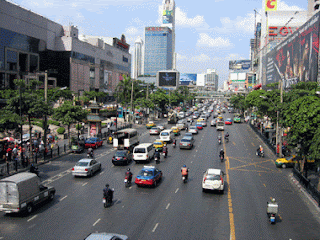Bangkok is the hub for most of the commercial and economical activities of the Kingdom. At the same time, the City is very famous and appreciated by visitors for its versatility and multiple points of interests.
There are many cultural landmarks and attractions in addition to its nightlife venues has made it synonymous with exoticism. Its rapid modernization, reflected in the cityscape and the urban society, has left untouched the historic Grand Palace, Wat Arun, Vimanmek Mansion Museum and hundreds of Buddhist temples draw about 10 million international visitors each year
For tourists, Bangkok has a feast of attractions to offer. The city is dotted with 400 glittering Buddhist temples of great beauty, magnificent palaces, classical dance performances, numerous shopping centers, and a still functioning traditional way of life, especially along the canals and the Chao Phraya River, the "River of Kings", which winds through the city; Bangkok truly is the "Venice of the East".
Transportation
River and canals network
The wide river Chao Phraya, flowing through the city, has several cross-river ferries and the Chao Phraya Express Boat with as many as thirty stops along the both banks extending as far as the northern suburb of Nonthaburi. And through downtown Bangkok runs the Khlong Saen Saeb, which has a canal boat service.
Inner - City Buses
A regular bus service is provided by the Bangkok Mass Transit Authority (BMTA) and it operates throughout Bangkok as well as to adjoining provinces.
Rail systems
Skytrain called BTS and MRT (Subway)
Airports
Suvarnabhumi Airport is Bangkok's official international airport and Don Mueang International Airport is still working for domestic flight
Taxis
"Taxis" are metered, with a fixed starting fare, and charge by distance and waiting time. Three-wheeled open-air motorized taxis called "tuk-tuks" are popular for shorter journeys. Price should be negotiated before the ride. Motorcycle taxis stands called "win motoesai" are found all over the city. Motorcycle taxis usually accommodate one, or sometimes two, passengers, and typically only cover small local areas.The fare for tuk-tuks and motorcycle taxis is usually negotiable between passenger and driver, except for cases where an organised taxi rank is in operation, where prices to certain locations may be printed on a sign on display at the rank. When two passengers use a motorcycle taxi the fare is usually doubled, although no such increases apply to tuk-tuks



No comments:
Post a Comment